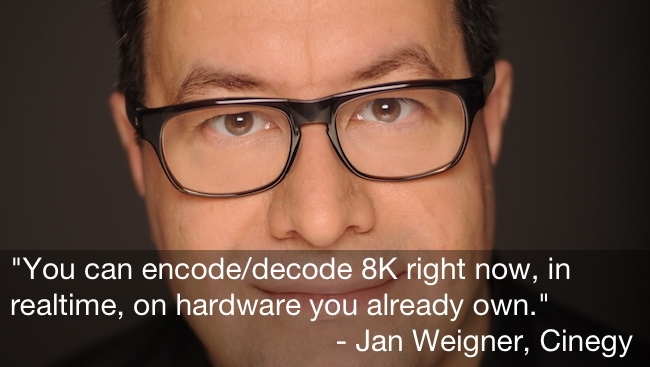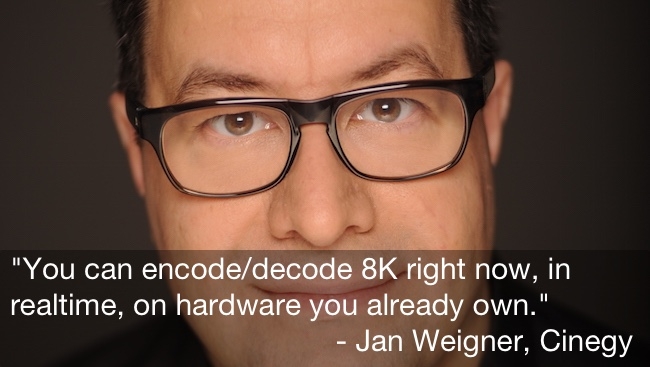
 Jan Weigner
Jan Weigner
Post specialist Cinegy has unveiled what it thinks is the world’s fastest codec, DANIEL2, capable of decoding up to 1100 frames per second of 8K video.
The speed is certainly impressive, even more so when you realise it was clocked at demos during IBC which were run on an off-the-shelf sub-$1000 PC equipped with an Intel quad core i7-6700K processor and an Nvidia GTX980Ti or Quadro M6000 graphics card.
Multiple 8K streams were decoded along with multiple 4K streams while performing realtime compositing, colour correction, scaling and titling, all with the results displayed in realtime in 8K.
The compression ratio has been stated as 1:10 to 1:20 working with 8K.
The key to the mezzanine codec’s performance is that it is optimised for GPUs. The company says that it can read streams from a disk or network and pass them to the GPU to be decompressed faster than the uncompressed frames can be copied. This prevents the system bus getting clogged and leaves plenty of headroom for other tasks.
All in all DANIEL2 uses less system bandwidth, consumes less disc or network bandwidth, and frees a CPU from the heavy lifting of video stream decoding so it can perform other tasks. In fact, the company reckons that using it you could encode or decode 8K in the here and now."
“The way that DNxHR, ProRes and XAVC codecs are architected doesn’t allow them to take full advantage of GPUs, and this is something that cannot – ever - be rectified," said Cinegy Managing Director Jan Weigner. "The usefulness of those codecs ends with 4K, in some cases even HD; and they certainly have no place in an 8K production workflow. However, with DANIEL2, you can encode/decode 8K right now, in real time, on hardware you already own.”
Its main use is going to lie in recording from camera sources —especially ultra slo-mo units which can rack up an impressive number of frames per second — as well as editing and post.
And as for 16K, it will decode that at 280fps.
More in the press release after the break.
Cinegy introduces world’s fastest video codec
DANIEL2 GPU codec makes debut during IBC 2015
MUNICH 23 September 2015 – Cinegy, which develops and produces software technology for digital video processing, asset management, video compression, automation, and playout unveiled “DANIEL2”, believed to be the world’s fastest video codec, during IBC 2015.
The new DANIEL2 codec is an acquisition and production codec designed for recording from camera sources, editing, and post-production as well as playout and was developed from inception to be GPU based with no dependence on legacy codec architectures. DANIEL2 can decode up to 1100 frames per second at 8K (7680x4320), 16x the resolution of full HD, which translates to over 17,000 frames of full HD per second.
Cinegy Managing Director Jan Weigner said, “Today, even if users could decode multiple 4K or 8K streams using a CPU, which they cannot, they would probably still want to use the power of the GPU for effects and filters. Then there is the issue of system bus bandwidth bottlenecks for those trying to transfer decoded streams to the GPU’s memory. This is where DANIEL2 shines as streams a fraction of the size of their uncompressed counterparts are read from disk, or via a network, and are passed to the GPU for decompression faster than uncompressed frames can be copied.”
As a result of its architecture, DANIEL2 offers three key benefits. It uses far less system bandwidth, consumes less disc or network bandwidth, and frees a CPU from the heavy lifting of video stream decoding so it can perform other tasks.
To verify its speed and accuracy, Cinegy used DANIEL2 on its IBC stand to decode multiple 8K and 4K streams while performing real time compositing, colour correction, scaling, and titling. The results were all displayed in real time 8K.
The hardware platform used for the DANIEL2 IBC demo was an off-the-shelf sub-$1000 PC, in this case equipped with an Intel quad core i7-6700K processor, and an Nvidia GTX980Ti or Quadro M6000 graphics card.
Weigner added, “The way that DNxHR, ProRes and XAVC codecs are architected doesn’t allow them to take full advantage of GPUs, and this is something that cannot – ever - be rectified. The usefulness of those codecs ends with 4K, in some cases even HD; and they certainly have no place in an 8K production workflow. However, with DANIEL2, you can encode/decode 8K right now, in real time, on hardware you already own.”
DANIEL2, as AVI and QuickTime codecs, will soon be available as an SDK for developers. This allows for seamless integration with existing applications such as Adobe Premiere, Adobe AfterEffects, AVID MediaComposer, Vizrt, or any other application that supports these containers.
DANIEL2 Features
• Up to 4:4:4:4 colour space for RGBA, keying, graphics overlays etc.
• Up to 8, 10, 12 or 16 bit colour depth
• Extremely low decoding latency
• Multi-generation re-compression without artefacts
• Efficient with "almost transparent" frames
• Selectable compression ratio from 1:3 to 1:30, adaptable, variable bit rate encoding
• Optimized for Nvidia CUDA
DANIEL2 Summary
• World’s fastest production and acquisition codec
• Designed for GPUs for maximum performance
• Architected to be very conservative with GPU memory bandwidth to leave computing resources to simultaneously perform GPU accelerated FX and composing
• Currently the only way to play professional quality 8K streams on affordable, commodity hardware or even using a consumer-grade laptop
DANIEL2 Decode Performance (using Nvidia Quadro M6000)
• HD 17000 fps
• 4K 4300 fps
• 8K 1100 fps
• 16K 280 fps
Tags: Technology



Comments